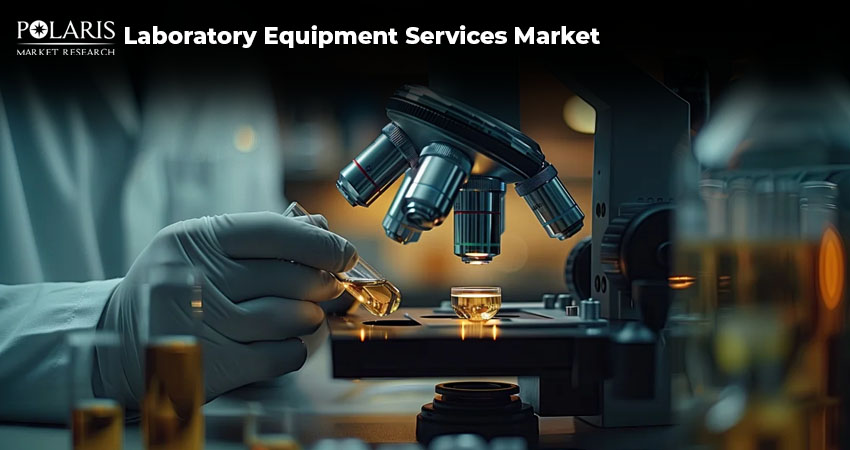Top 5 Companies in Laboratory Equipment Services Market to Know in 2025

Laboratories are an important part of several sectors. They perform various experiments and research activities. Conducting research activities requires the use of various tools and equipment. And to ensure optimal performance, regular maintenance and calibration of these devices are needed.
Laboratory equipment services help ease the maintenance tasks of lab equipment. This blog post explains what lab equipment services are. It also covers the available service types and emerging trends shaping the market landscape. Continue reading!
Understanding Laboratory Equipment Services
Laboratory equipment services include various practices that ensure the proper functioning of lab equipment. These services encompass the installation and calibration of lab equipment. Repairing tools and predictive maintenance also fall under these services. As with service laboratories, lab equipment services ensure that the instruments stay reliable and offer accurate results.
Types of Laboratory Equipment Services
Below, we’ve explained to you the main types of lab equipment services:
Preventive Maintenance: Equipment breakdown can be costly for labs. Predictive maintenance helps with this by conducting regular inspections and minor repairs. Typical tasks involved in predictive maintenance include scheduled cleaning and making adjustments. Applications of lubricants in equipment that needs them are also done.
Calibration Services: The results of lab equipment must be reliable and accurate. And calibration services help ensure that. They compare the instrument output with standardized measurements. These services are often used for equipment such as balances and pipette sensors.
Repair Services: Equipment that is malfunctioning or has broken down needs repair services. These services may involve replacing faulty components or providing a fix to software issues.
Installation and Validation: Setting up a new device or instrument in a lab necessitates installation and validation services. Along with setting up the equipment, these services also ensure that the instrument meets regulatory standards.
Training and Consultation: Training and consultation services are needed to help lab staff understand proper usage and maintenance of lab equipment. These services are typically used during the hiring of new lab coordinators.
Top Companies Offering Laboratory Equipment Services
The laboratory equipment services market has the presence of several players. Below, we’ve listed some of them:
Thermo Fisher Scientific
Thermo Fisher Scientific was established in 1956 and has its headquarters in Waltham, Massachusetts, USA. Since its establishment, the company has become a global leader in science. The company’s end-to-end laboratory solutions include calibration and asset management services. It also offers key services such as comprehensive equipment validation, repair, and training programs. Thermo Fisher Scientific’s advanced digital tools, such as the SmartCare predictive maintenance platform, help reduce equipment downtime.
Agilent Technologies, Inc. is a multinational company with its headquarters located in Santa Clara, California, USA. It provides laboratory consumables, software, instruments, and services. Agilent is also a leader in software upgrades, calibration, and preventative maintenance for chromatography and spectroscopy systems. It offers customizable service packages that meet specific laboratory requirements.
PerkinElmer
PerkinElmer was established in 1937 and is a leading player in laboratory analysis. Its technology plays a vital role in maintaining safety and compliance throughout various lab applications. PerkinElmer is based in Waltham, Massachusetts, and has 19 office and retail sites spread across the US. It mostly specializes in providing preventative maintenance and troubleshooting for diagnostics and analytical equipment.
Shimadzu Corporation is a publicly traded KK company from Japan. It specializes in the development of precision instruments, measuring devices, and medical equipment. Shimadzu provides services for life sciences, equipment diagnosis, calibration, preventative maintenance, and environmental testing equipment. Shimadzu places significant emphasis on sustainability and energy-efficient operations.
Sartorius
Sartorius AG is the parent company of the Sartorius Group. Its headquarters are in Göttingen, Germany. The company focuses on liquid chromatography, mass spectrometry, and associated services. It also provides services for chromatography and mass spectrometry systems, along with software upgrades.
Trends Shaping Laboratory Equipment Services
A few of the key trends in the laboratory equipment services market are:
Digitization and IoT Integration: Digital advancements are revolutionizing the delivery of laboratory centrifuge and equipment services. IoT technology now enables monitoring instrument performance in real-time. Predictive maintenance systems using AI can help identify potential issues.
Focus on Regulatory Compliance: The pharmaceutical and healthcare sectors have stringent regulatory requirements to adhere to. As such, service providers are now focusing on offering compliance-ready solutions. Services such as IQ/OQ and equipment validation have increased in demand due to the introduction of stringent rules.
Outsourcing Service Models: Outsourcing is being increasingly favored by companies to reduce operational costs. Managed service providers are responding to this by offering bundled solutions. Bundled solutions may include various services, ranging from repair to compliance.
Sustainability Initiatives: Adoption of eco-friendly practices has increased among service providers. These practices help them meet different regulatory guidelines.
Rise of Subscription-Based Service Plans:Pay-as-you-go and subscription models are on the rise. These models enable effective cost management for labs.
In Conclusion
Laboratory equipment services are essential to ensure that lab tools are accurate and reliable. By managing compliance and performing equipment repair, these services help improve productivity. They also take away potential risks associated with faulty equipment. Automation across labs is expected to expand the role of these services in the years to come.

